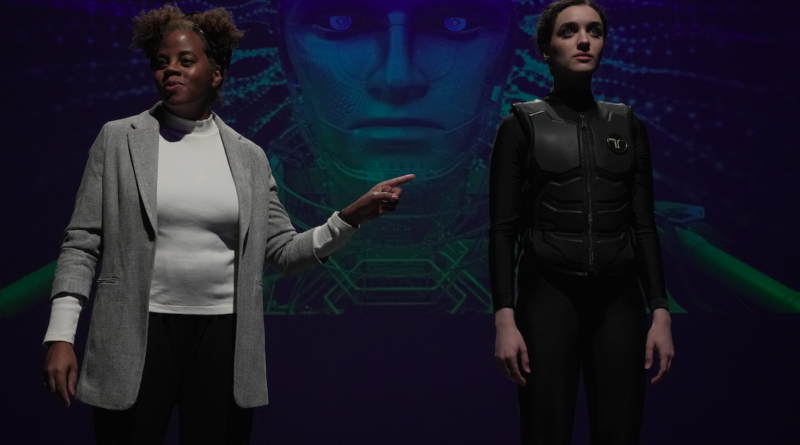INTERVIEW: In ‘Bioadapted,’ Transforma Theatre explores AI technology
Photo: Bioadapted stars Halima Henderson and Melody Munitz. Photo courtesy of Jarret Robertson / Provided by Emily Owens PR with permission.
Theater has always been a venue to investigate and explore important issues that impact society and culture, and New York City’s Transforma Theatre is doing just that with their new show Bioadapted, now running through Sept. 24 at CultureLab LIC in Queens, New York. The show focuses on AI technology and utilizes EEG headshots and a GPT-3 avatar, according to press notes. If these abbreviations make sense, then Bioadapted should be an interesting ride. If those abbreviations feel like alphabet soup, seeing the show is doubly important.
The play is billed as an investigative documentary with actors portraying real people and real scientists. Interwoven with these nonfiction elements are speculative scenes about AI’s potential future — the good, the bad and the scary. Specifically, the show pulls text from the following works: Singular: Possible Futures of the Singularity by James Yu; Affinity by Alexis Roblan; Coded Bias, Future Couples, Part 1 and 2, and Trial of GPT-3 by Tjaša Ferme.
Ferme not only provides some of the source material. She’s also the creator and director of the show, and serves as artistic director of Transforma Theatre. Recently she exchanged emails with Hollywood Soapbox about Bioadapted. Questions and answers have been slightly edited for style — and not produced via AI technology.
How long has Bioadapted been in development?
The journey with Bioadapted started after reviewing the transcript of Science in Theater Festival’s panel, which was on the topic of bio media, and Heidi Boisvert’s work. I love absurdity and “meta theatre,“ so this instantaneously inspired me. And I started itching to find the missing pieces. When we found the brilliant James Yu’s Singular: Possible Futures of the Singularity, I started creating a script with other transcripts, making it an investigative theater documentary with reenactments of scientists and real people. That led to the first staged reading in October 2022. When ChatGPT came out and got such media attention we knew we were going in the right direction since we’ve been working with GPT-3 for a while by that point. We’ve also been working with brain scanners, EEG headsets and have been investigating different applications of BCI (brain computer interface) to influence actors’ movements with brain data.
What exactly can audience members expect at the show? This seems to be a unique experience.
The play is intense, meta, absurd, eerie and humorous with documentary-style scenes, paired with fictional pieces, pushing the envelope of technology. It’s a real joy to be able to work on a piece that allows us to respond in real time to today’s emerging issues. Right now a prominent narrative is how AI is a threat to artistic professions. Major artistic unions are on strike in order to negotiate a better deal for humans, ultimately. We added a scene of an actor going into an audition whose likeness was stolen and replicated by an AI for an AI-generated TV show, based on a real story! The audiences will also be able to interrogate GPT-4 and put it on trial. We built a custom-made avatar so that this can happen in real time. We have created a BCI (brain computer interface) through an EEG headset. Its data is being sent to a haptic vest, sending haptic patterns of vibration to an actor responding with movement.
Generally speaking, are you welcoming of AI technology or worried about its potential?
We love to play with technology and utilize it in uncanny and creative ways. But in general I would say this piece is like a kaleidoscope of many perspectives, some of which are fun and exciting, like creating new senses for humans, and the others that are haunting, detrimental and even fatal. We are not interested in preaching any right way but opening many perspectives and giving the audience an opportunity of making their own informed decision on where they stand.
Is the show educational for those who are brand new to AI?
Yes, definitely! I think the show opens new perspectives regardless of what you know about AI. It shares both a scientific, innovator’s as well as a futurist’s perspective. The fictional pieces explore the limits of aspects of technology through imagination.
How does the interactive theater allow audiences to engage more with the material?
The audience will put GPT-4 on trial and interrogate it directly in real time through a custom built avatar. This way they will be able to engage with it first hand and get a direct experience.
Has science and technology always interested you?
At some point I was working on The Economist’s sustainability campaigns, and their focus at the time was on “future forces” reporting on neuroscience, epigenetics, artificial intelligence and sustainability. That set me off on a deep dive on YouTube and TED. I remember seeing Particle Fever about Cern’s Particle Accelerator, [which] blew my mind. At that point I knew I wanted to create work around technology, including scientific inquiry and experiments!
By John Soltes / Publisher / John@HollywoodSoapbox.com
Bioadapted, created and directed by Tjaša Ferme, runs through Sept. 24 at CultureLab LIC in Queens, New York. Transforma Theatre produces the show. Click here for more information and tickets.

